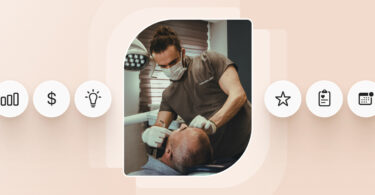Before guests book a room, they check out your hotel on Instagram, scroll through reviews, and watch TikTok videos of your property. That makes social media marketing for hotels crucial in how you show up where travelers are already looking
According to an American Express study, 75% of travelers turn to social media to research and find inspiration for their next trip, surpassing even recommendations from friends and family.
Whether you’re a boutique stay, a luxury resort, or a roadside inn, what you post can inspire bookings, earn trust, and set your brand apart from the competition.
In this blog, you’ll learn proven strategies and actionable insights for effectively leveraging social media to grow your hotel brand.
Bottom Line Up Front: What separates winning hotel brands on social media
If you’re short on time, here’s what high-performing hotels get right with social media:
✅ They focus on trust before transactions. Great hotel brands use social media to connect, not just to sell.
✅ They show up where guests spend time. Think Instagram Reels, TikTok videos, and Google Reviews, not just Facebook posts.
✅ They keep it real. User-generated content, behind-the-scenes glimpses, and real guest stories beat polished promos.
✅ They’re consistent. Showing up regularly matters more than going viral once.
✅ They use the right tools. AI-powered automation helps them save time, stay on-brand, and respond fast.
Read on for practical strategies, platform tips, and real post ideas you can start using today.
Table of contents
- 8 reasons hotels can’t ignore social media marketing
- How to identify your hotel’s target audience
- How to build an effective social media marketing strategy for hotels in 3 steps
- Which social media platforms should hotels prioritize?
- 10 actionable social media strategies to grow your hotel’s brand on social media
- Want your hotel to stand out? Try these advanced social media marketing strategies tailored to your property type
- How to build a social media crisis management plan for your hotel’s brand
- Best practices for you to navigate social media crises effectively
- 4 common mistakes to avoid while doing social media marketing for hotels
- How to measure success in hotel social media marketing?
- 7 creative social media post ideas for hotels that drive bookings
- Emerging social media marketing trends for hotels
- FAQs on social media marketing for hotels
- Maximize social media marketing for hotels with Birdeye Social AI
8 reasons hotels can’t ignore social media marketing
The way travelers make booking decisions has drastically evolved, with social media marketing for hotels playing a pivotal role in this shift.
Travelers now rely on social media platforms like Instagram, Facebook, and TikTok to discover and book their next trip. Therefore, hotels must do more than exist on these channels—they need a tailored approach to connect with guests, build trust, and showcase their unique selling points.
Here’s how social media marketing can make huge differences for hotels looking to improve their online presence:
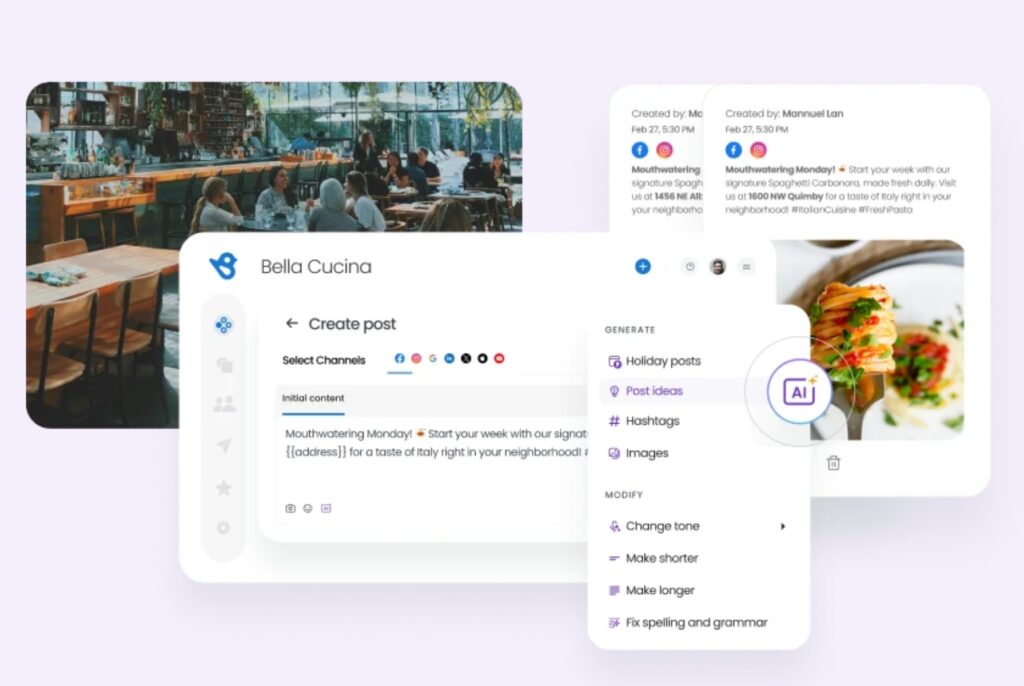
1. Build real relationships with your guests
Active social media management across channels gives your hotel a way to talk with guests, not just at them. Replying to a story tag, commenting on a review, or celebrating a repeat visitor are small moments that build emotional connections. It’s a great way to boost guest loyalty and turn one-time visitors into regular customers.
2. Drive more direct bookings
Social posts can include links to booking engines, swipe-up offers, or limited-time deals. With the right CTA, you can turn a casual scroller into a confirmed guest, without paying commission to online travel agencies (OTAs).
With Birdeye Social AI, one of the best AI tools for social media, hotels can scale their efforts, streamline social media management and get more bookings while staying ahead of the competition.
3. Boost brand visibility among global and local audiences
Hotels operate in a highly competitive hospitality industry where standing out is key. By showcasing your hotel brand’s values and experiences on social media pages, you’re able to reach diverse audiences globally and locally.
Highlighting your property’s ambiance through visual content attracts both new customers and repeat guests.
4. Leverage user-generated content
Encouraging user-generated content (UGC) is like turning your guests into your biggest marketers. Whether it’s a couple posting honeymoon photos or a solo traveler sharing their meal at your restaurant, UGC adds an authentic layer to your hotel’s social media marketing while inspiring prospective guests to trust your property.
5. Connect with millennial and Gen Z travelers
Social platforms like TikTok are reshaping how younger travelers discover destinations. Hotels that embrace trends like challenges or interactive videos can use these major platforms to tap into a growing segment of active users who crave authentic experiences.
6. Tell your brand story visually
Hotels are visual spaces, making social media platforms like Instagram and Pinterest natural fits. Through a strategic combination of photography, live videos, and short-form clips, hotels can showcase their unique selling points such as luxurious suites, spa facilities, or rooftop dining with dramatic views.
7. Drive last-minute bookings with targeted ads
When occupancy rates dip, a quick social media campaign offering flash sales or last-minute packages can be a game-changer. Using paid advertising options like retargeting, hotels can directly target users who’ve already interacted with their social media posts or websites.
8. Gather insights from guest conversations
Reviews, comments, and DMs give you a real-time window into what guests are thinking. Spot recurring complaints, celebrate positive mentions, or test new offers to see what sticks.
How to identify your hotel’s target audience
A successful social media marketing strategy starts with understanding who you’re speaking to. Without knowing your target audience, your efforts may miss the mark, resulting in lost opportunities to engage potential guests or drive more direct bookings.
Here’s how hotels can identify their target market and ensure their social media accounts are engaging the right people:
1. Segment guests by demographics and preferences
Hotels define their audience by analyzing age, income level, travel purpose, and interests. For example, business-class properties often focus on business travelers, while resorts appeal to families and leisure travelers.
Knowing these segments helps refine your hotel’s social media management strategy to reach the right potential guests.
2. Understand their travel motivations
Leisure guests prioritize experiences, relaxation, and activities, while business travelers value convenience, location, and meeting facilities. Your social media channels should highlight offerings tailored to these groups, like family packages for leisure travelers or coworking spaces for professionals.
3. Use analytics to gain insights on audience behavior
Social media management tools like Facebook Insights and Instagram Analytics reveal valuable data about your active users, including where they’re from, what content they engage with, and when they’re online.
For example, Gen Z travelers may discover your hotel through Reels, while older audiences may engage more on Facebook. Therefore, these tools help you refine your social media strategy and improve targeting accuracy.
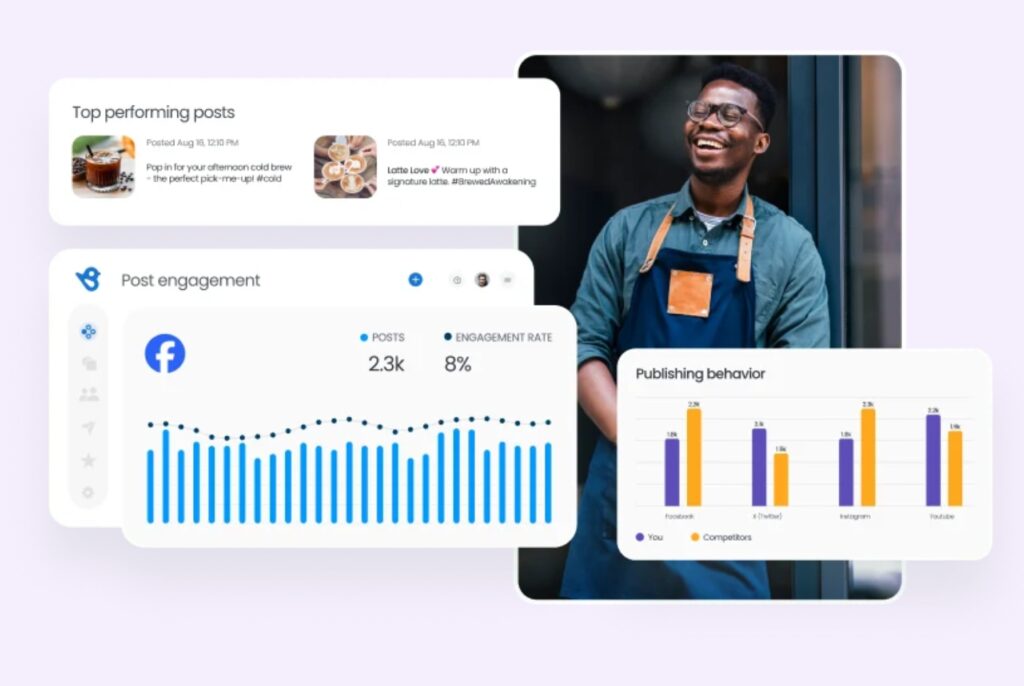
4. Adapt content for domestic and international audiences
Cultural differences influence how travelers respond to visual content and messaging. Hotels targeting international prospective guests should create multilingual posts and emphasize local attractions, while domestic travelers might respond better to weekend getaway promotions.
5. Align your strategy with audience insights
Once you know your audience, tailor your content themes, tone, and promotions to match what matters to them most. For example, A family resort might highlight kid-friendly features, flexible meal plans, and reviews from other parents, while a luxury retreat might focus on spa experiences, fine dining, and peaceful, adults-only amenities.
How to build an effective social media marketing strategy for hotels in 3 steps
To maximize the potential of social media marketing, hotels must develop a structured and results-driven approach. A clear social media strategy ensures that efforts align with your business goals, whether it’s achieving more direct bookings, increasing brand recognition, or engaging your target audience.
These three steps will help you create a robust social media marketing strategy that resonates with potential guests and boosts your hotel’s visibility across social channels:
1. Define your hotel’s brand voice and values
Your hotel’s brand identity needs a consistent tone across all social media accounts to build trust and authenticity. A luxury hotel might opt for a refined, elegant tone, while a boutique hotel could use a more personal, creative approach.
2. Set SMART goals to measure success
Establishing Specific, Measurable, Achievable, Relevant, and Time-bound (SMART) goals ensures your social media campaigns are focused and actionable.
For example, goals like increasing active engagement on your Instagram Business account by 20% in three months or achieving 30% more website traffic through Facebook ads are clear and trackable.
3. Create a long-term content calendar
Consistency is key to maintaining active social media channels. Plan your social media posts around seasonal themes, local events, and property highlights. Incorporate a mix of formats, such as live videos, user testimonials, and behind-the-scenes clips, to keep your content engaging and relevant for your existing audience and new followers.
Sample weekly content mix for hotels
Not sure what to post? Here’s a simple content calendar to get you started:
• Monday: Guest testimonial or user-generated content (UGC)
• Wednesday: Promote upcoming events or limited-time offers
• Friday: Behind-the-scenes video with staff or a peek into a room setup
• Sunday: Poll or Instagram Story asking followers for feedback or preferences
This mix helps keep your content varied, engaging, and aligned with your brand voice—all while connecting with your guests in real time.
Which social media platforms should hotels prioritize?
Choosing the right social media platforms is critical for creating an impactful social media marketing strategy. Each platform caters to unique audiences and content formats, so understanding where your target audience spends their time is essential.
Hotels that strategically select and optimize their presence on these social media channels can significantly increase active engagement, attract prospective guests, and ultimately drive more bookings.
Below is a breakdown of the top platforms for hotel social media marketing and how to use them effectively:
Focus on Facebook for versatile engagement
With a well-designed Facebook Page, hotels can reach diverse audiences, from families planning vacations to business travelers looking for convenient stays.
A Phocuswright study revealed that 52% of travelers use Facebook to research and plan their trips, making it a critical platform for hotel marketing. Use tools like event promotions, paid ads, and localized offers to capture interest and direct users to your hotel website for more direct bookings.
For example, Marriott Hotels regularly posts local event announcements and direct booking promos to boost off-season occupancy.

Leverage Instagram for visual storytelling
Instagram’s highly visual format makes it perfect for showcasing unique selling points like luxurious rooms, scenic views, and signature amenities.
According to a Facebook IQ study, 76% of travelers use Instagram for travel inspiration, and 60% of Instagram users say they use the platform to research travel destinations. Utilize Stories, Reels, and carousel posts to engage followers and highlight your hotel’s culture. Adding location tags and hashtags further boosts discoverability among potential guests.
For example, the Moxy Hotels brand uses Instagram to share quirky, guest-centered content under the hashtag #atthemoxy.

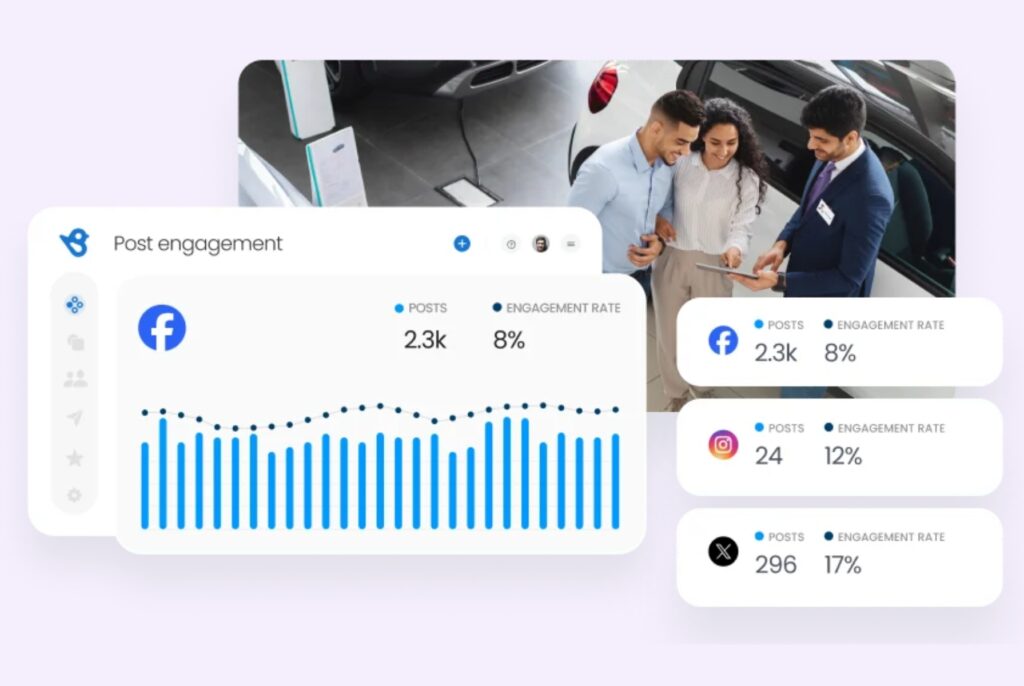
Use TikTok to attract younger audiences
TikTok offers an unparalleled opportunity to connect with a younger target market through engaging, authentic content. A Skift Research report shows that 73% of Gen Z travelers use social media to plan their trips, with TikTok becoming increasingly influential.
Hotels can create short, entertaining videos featuring property tours, quirky behind-the-scenes moments, or trending challenges to capture the attention of active users.
For example, @GraduateHotels creates playful, themed room videos with trending TikTok sounds and transitions that appeal to younger travelers.
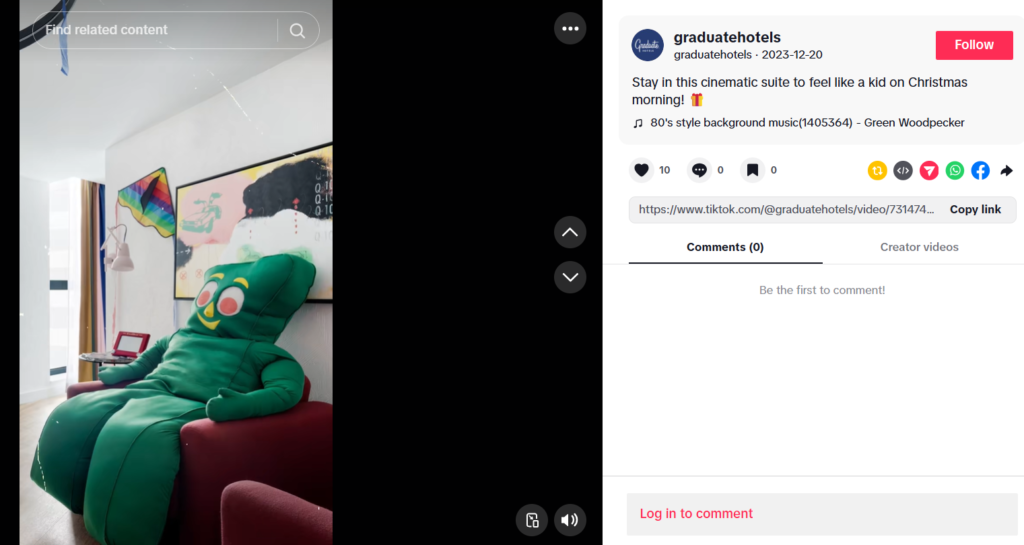
Tap into LinkedIn for business travelers
For hotels catering to business travelers, LinkedIn Business Page serves as a professional hub to showcase meeting facilities, corporate packages, and testimonials from satisfied corporate clients. Maintain an active business page to share posts that appeal to corporate decision-makers.
According to a news study, most corporate decision-makers use LinkedIn to evaluate potential hotel and accommodation options for business trips.
Highlight travel inspiration on Pinterest
Pinterest is ideal for sharing aspirational travel content and building mood boards that reflect your hotel brand.
A Pinterest internal study revealed that 72% of users use the platform to plan their travel experiences, with 49% making purchase decisions directly from Pinterest.
Showcase your property’s ambiance, local experiences, and insider travel tips through high-quality visual content to attract prospective guests planning their trips.

Boost visibility through YouTube’s long-form video content
According to Think with Google, 64% of travelers watch online videos when looking for travel inspiration, with YouTube being the primary platform. YouTube allows hotels to feature in-depth property tours, guest testimonials, and destination guides.
These videos not only engage your audience but also drive traffic to your website, converting viewers into loyal guests.
10 actionable social media strategies to grow your hotel’s brand on social media
A well-rounded social media marketing strategy goes beyond maintaining social media accounts or sharing sporadic updates. To stand out in the competitive hospitality industry, hotels must implement focused strategies that drive more direct bookings and increase brand awareness.
Here are 10 proven strategies to elevate your hotel’s social media marketing efforts:
1. Define your brand voice
- Choose a tone that matches your property—charming, luxurious, playful, or professional.
- Be consistent across captions, replies, and Stories.
2. Leverage short-form video
- Use Reels and TikToks for room tours, staff highlights, or local spots.
- Add trending sounds and hashtags to expand reach.
3. Engage, don’t just post
- Reply to every comment and DM. Guests remember responsiveness.
- Ask questions in captions to spark conversation.
4. Showcase your location
- Share neighborhood gems, weekend itineraries, or sunrise views from the property.
- Tag local businesses and attractions for cross-promotion.
5. Feature your amenities and experiences
- Spotlight your pool, spa, breakfast buffet, or pet policy with behind-the-scenes content.
- Use carousels or Stories to show different features in action.
6. Partner with local creators
- Invite travel influencers or micro-creators for a stay or content collab.
- User-generated posts feel more authentic than brand ads.
7. Run giveaways or contests
- Offer a free night or discount for sharing your post, tagging friends, or using a hashtag.
- Great for boosting reach and engagement fast.
8. Tell stories, not just promos
- Share guest testimonials, staff profiles, or a “day in the life” at your hotel.
- Human stories make your hotel more relatable.
9. Post consistently with a content plan
- Schedule posts ahead using tools like Birdeye Social or Meta Suite.
- Stay top-of-mind with at least three to four posts per week.
10. Track what works and adapt
- Monitor engagement, reach, and click-throughs regularly.
- Double down on formats and topics that resonate.
These practical strategies will help your hotel brand’s social media engagement with its target audience, generate higher ROI, and make your social media campaigns more impactful.
Want your hotel to stand out? Try these advanced social media marketing strategies tailored to your property type
Each type of property caters to a unique target audience, and your social media marketing for hotels should reflect these differences. From luxury resorts to boutique gems, crafting a tailored marketing strategy ensures your content resonates with your potential guests and helps you drive more direct bookings.
Here’s how to align your hotel brand’s social media campaigns with the specific needs of your property type:
Luxury hotels: Create exclusive social experiences
Luxury travelers expect a premium experience, both online and offline. Highlight exclusive amenities like private pools, spa packages, or concierge services through immersive video content.
Use platforms like Instagram and Pinterest to showcase high-end visuals that elevate your hotel’s social media marketing efforts.
Boutique hotels: Highlight unique character
Boutique hotels thrive on charm and individuality. Share stories about your property’s history, design elements, or connection to the local community.
Using user-generated content, such as guest reviews or shared Instagram posts, can further emphasize your hotel’s distinct identity.
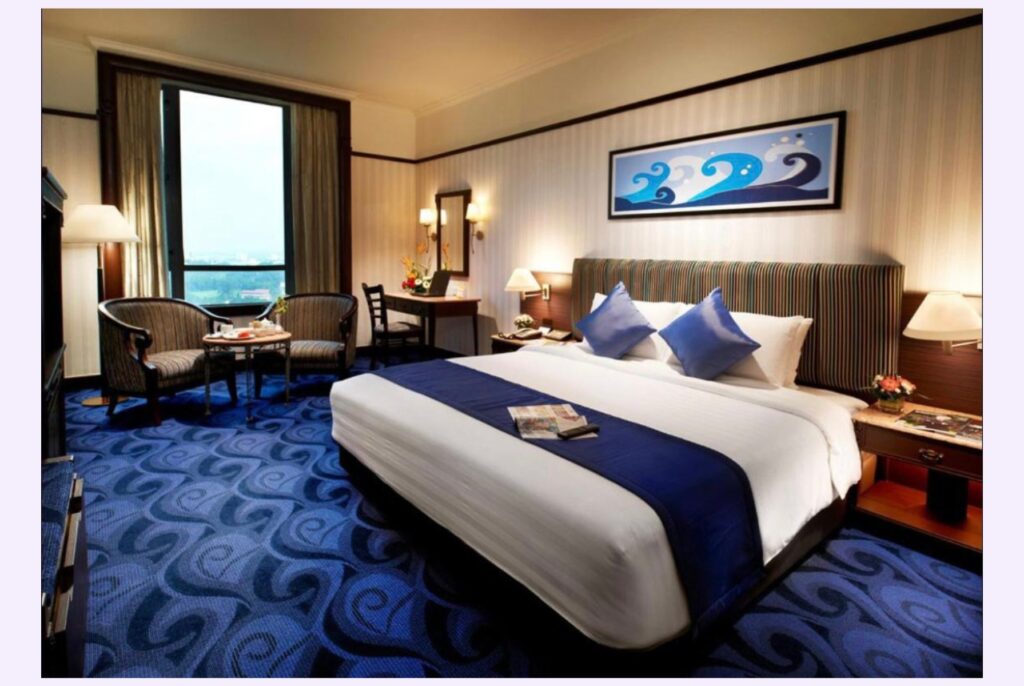
Business hotels: Engage corporate clients
For hotels catering to business travelers, focus on features like meeting rooms, coworking spaces, and proximity to business hubs. LinkedIn is an ideal platform for sharing testimonials from corporate clients or promoting business packages, reinforcing your hotel’s value to professionals.
Resort hotels: Showcase experiences
Resorts offer more than just accommodation—they offer experiences. Use social media campaigns to highlight activities like beach outings, adventure sports, or wellness retreats.
Incorporate live videos or Instagram Stories to take your audience behind the scenes of these memorable moments.
Budget hotels: Communicate value proposition
Budget travelers prioritize affordability without compromising comfort. Use social media channels to emphasize perks like free breakfast, convenient locations, or discounts on extended stays. Focus on how your hotel business has delivered great experiences for previous guests and share accessible options to appeal to potential guests.
How to convert social media followers into hotel guests?
Embed links in posts, Instagram Stories, and bio sections on all the platforms.
Turn storytelling into booking opportunities. End each story with a direct CTA like “Ready to experience this? Click to book your stay now.” Storytelling that combines emotion with action helps drive traffic and solidify bookings.
Engage followers with interactive features like polls, quizzes, or Q&A sessions can help guide guests toward booking decisions.
How to build a social media crisis management plan for your hotel’s brand
Your online reputation management is as critical as providing a flawless guest experience. Social media platforms have become the primary stage where potential guests form impressions about your hotel. A single negative review or poorly handled comment can significantly affect bookings and trust.
When a crisis hits—whether it’s a guest complaint going viral or a misstep in your messaging—this 5-step quick-response plan can help you stay calm, professional, and in control:
1. Listen: Monitor tags, mentions, DMs, and reviews to catch issues early.
2. Acknowledge: Respond quickly with empathy and transparency—even if you don’t have all the answers yet.
3. Respond: Use a consistent voice across platforms. Stick to facts and avoid emotional replies.
4. Escalate if needed: Loop in your GM, legal team, or corporate if the issue is complex or gaining traction.
5. Learn & adjust: After the situation is resolved, review what happened and update your crisis playbook.

Best practices for you to navigate social media crises effectively
1. Address negative feedback with transparency
When faced with negative reviews or comments, respond promptly and professionally. Acknowledge the issue, apologize where appropriate, and offer a solution publicly before continuing the conversation privately. This shows prospective guests that your hotel is committed to resolving issues and values guest feedback.
2. Create a proactive crisis communication plan
Prepare for potential crises by having pre-approved responses and escalation workflows in place. This ensures consistency and speed in addressing sensitive situations.
For example, if a weather-related cancellation disrupts bookings, a quick update on all social channels with clear instructions for affected guests prevents misinformation.
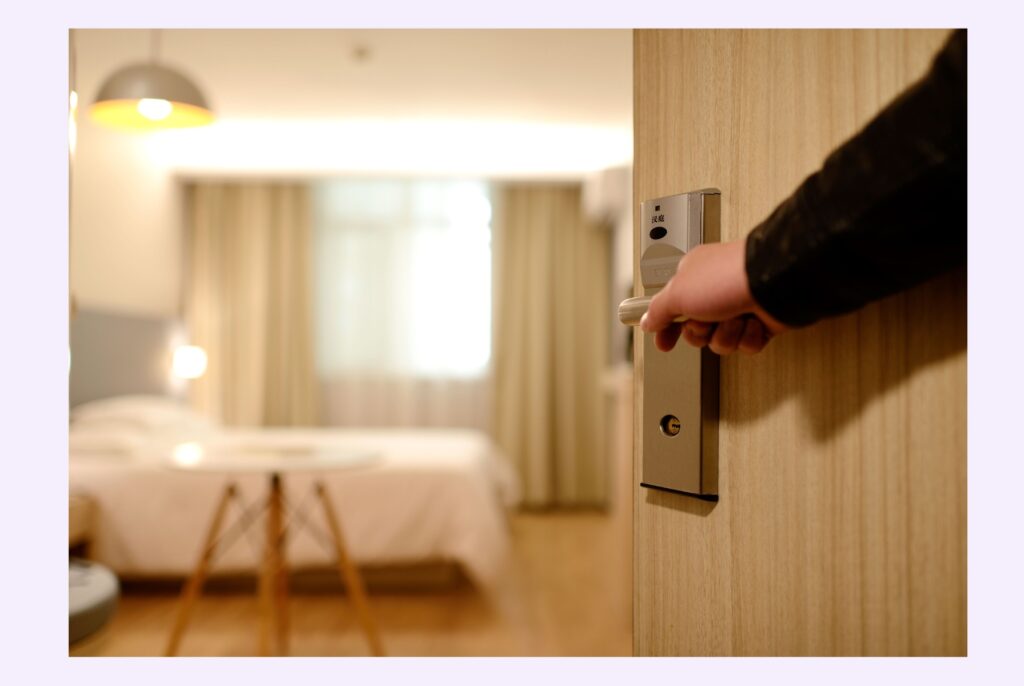
3. Use positive reviews to offset challenges
Leverage glowing testimonials from previous guests during a crisis to reinforce trust. For instance, share a carousel of guest reviews on your Facebook Page or Instagram Stories to showcase people’s great experiences, balancing any negative publicity.
4. Build trust through ongoing engagement
Consistency in engaging with your audience helps establish goodwill that can buffer against crises. Regularly repost user-generated content, answer inquiries, and highlight your team’s efforts to ensure guest satisfaction. A well-engaged audience is more likely to support your hotel during challenging times.
5. Turn crises into learning opportunities
For instance, if recurring complaints highlight the same operational issue, use this feedback to improve internal processes and communicate changes to your audience. This transparency enhances your hotel business’s credibility.
The only social media software for multi-location businesses
Want to see the impact of Birdeye on your business? Watch the Free Demo Now.
4 common mistakes to avoid while doing social media marketing for hotels
Even the best social media marketing strategy can falter if common mistakes are overlooked. The hotel industry is competitive, and avoiding missteps is crucial for ensuring your efforts resonate with your target audience and drive meaningful results.
Here are the top pitfalls that could harm a hotel’s reputation management and how to counter them:
1: Ignoring guest engagement
Social media isn’t just about broadcasting content; it’s a two-way conversation. Failing to respond to comments or inquiries can harm your social media influence and make your hotel presence appear disconnected. Actively engaging with guests builds trust and encourages more followers to interact with your brand.
2: Overusing stock content
Authenticity matters. Relying too heavily on generic or stock images, especially on visual platforms like Instagram or Pinterest can weaken your personal brand and fail to showcase what makes your property unique. Instead, focus on sharing real guest experiences, professional photos of your property, and highlights from special events.
3: Neglecting analytics and data-driven decisions
Without tracking performance, hotels miss opportunities for growth. Social media is a powerful tool, but its potential is only realized when insights from online platforms guide your marketing strategy. Analyze social channels metrics like engagement rates and follower growth to refine your approach.
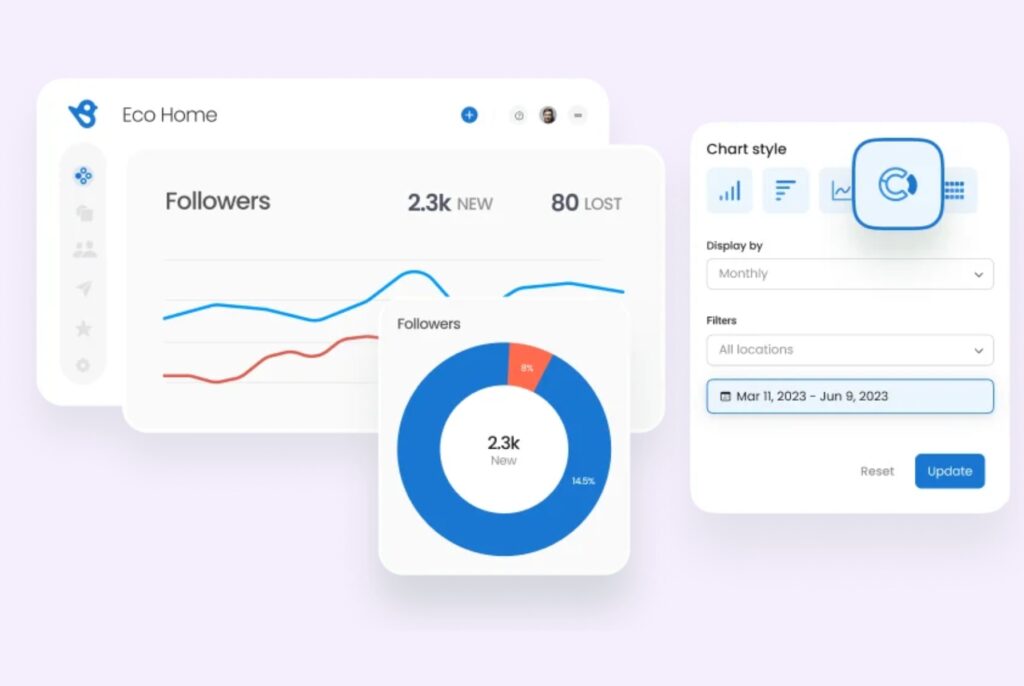
4: Over-promoting without adding value
All social channels are a powerful tools, but constantly pushing offers, discounts, or bookings without offering meaningful interactions makes your presence feel transactional rather than engaging. Use it for storytelling, by building authentic human connections about your brand and community-building, not just sales.
To avoid this mistake, focus on balancing promotional posts with value-driven content. Share travel tips, behind-the-scenes stories, or features of local attractions to make your social channels more engaging.
How to measure success in hotel social media marketing?
Success on social media isn’t measured by likes alone; it’s about achieving tangible outcomes aligned with your social media marketing strategy. In the hotel industry, this means increased bookings, higher engagement, and a loyal community of more guests. Here’s how to track and assess your performance:
1. Monitor key metrics
Focus on actionable metrics such as click-through rates, users spend on your site, and conversion rates. These numbers provide insight into how effectively your social channels are driving bookings and building engagement.
2. Use reporting tools for detailed insights
Instagram’s in-built tool, Instagram Insights or Meta’s Business Suite are indispensable for social media management. But if you need a single platform to get deeper insgihts of all the social media channel, you should consider Birdeye Social AI to understand audience behaviors and identify areas to optimize, such as post timing or ad effectiveness.
3. Evaluate long-term ROI
Beyond short-term results, measure how your campaigns contribute to brand equity and revenue growth. Successful social media marketing isn’t just about gaining more followers; it’s about delivering lasting value by engaging your audience and driving bookings.
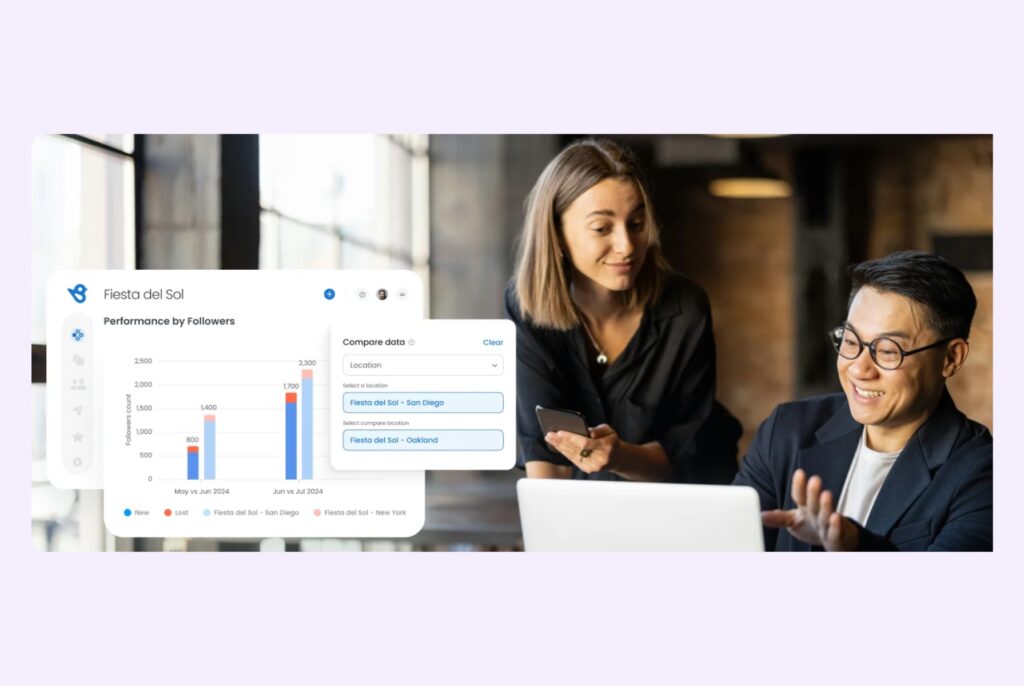
7 creative social media post ideas for hotels that drive bookings
Generating engaging and impactful content is essential for any hotel’s social media marketing strategy. Hotels can use creative ideas to captivate their target audience, build trust, and ultimately encourage more guests to book.
Here are seven innovative social media post ideas to elevate your hotel’s digital marketing game:
1. Highlight your hotel’s standout features—like infinity pools, rooftop bars, or cozy reading nooks—through high-quality visual content. Use Reels or Stories to give a “live” experience of these spaces, encouraging users spending time online to imagine themselves there.
2. Share local travel guides and tips. Pair these guides with location tags to help potential travelers discover your property while planning their trip.
3. Feature user-generated content from previous guests, like honeymoon photos or family vacation videos. These authentic experiences is great to build brand awareness.
4. Post about special events and packages. Use a creative angle, like “Your Dream Valentine’s Stay Awaits,” to make your promotions more appealing and personal.
5. Host interactive Q&A sessions by answering common travel queries through Instagram Live or Stories. This not only builds a direct connection with your audience but also positions your brand as approachable and helpful.
6. Highlight your team and behind-the-scenes moments. Humanize your hotel business by sharing posts about your staff’s efforts, from a chef preparing signature dishes to the concierge setting up a surprise for a guest.
7. Use storytelling to promote seasonal experiences. Create posts that narrate experiences, such as “A Winter Wonderland Escape” or “Summer by the Beach,” showcasing how guests can enjoy specific seasons at your hotel.
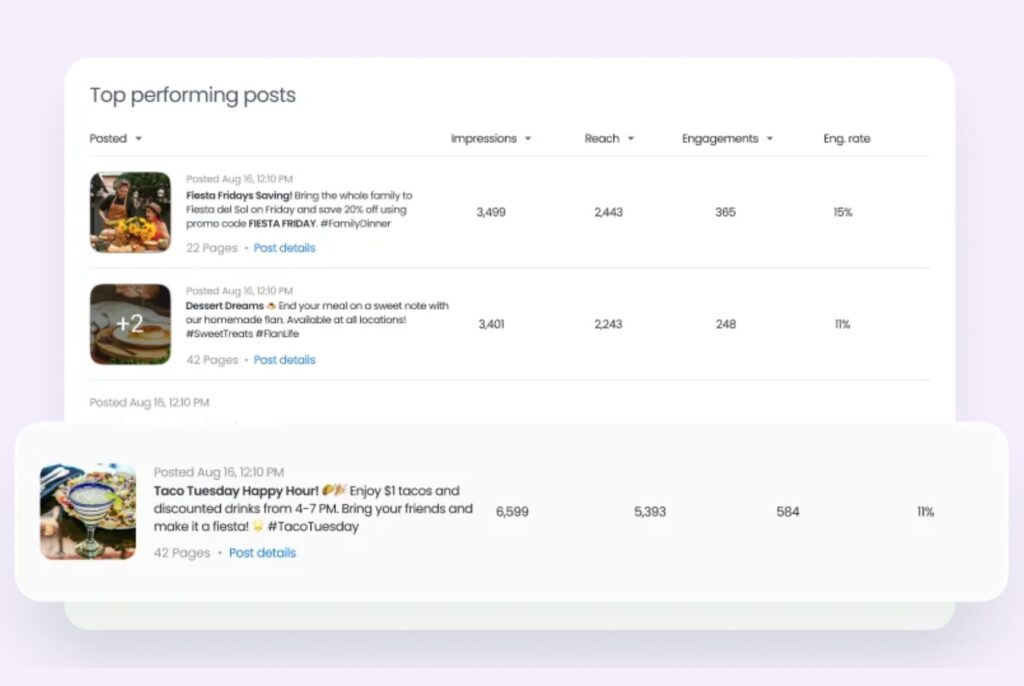
Emerging social media marketing trends for hotels
This is constantly evolving, and the way hotels use social media platforms to connect with their audiences is no exception. Staying updated on the latest trends like clever use of influencer marketing encourage guests to trust your brand. This signals you’re upbeat with latest trends and ensures your hotel social media strategy remains competitive and relevant.
Here are the key social media trends in hospitality:
1. Hotels actively use social channels for social commerce
Social media is now becoming a direct booking platform for hotels. Instead of just showing attractive pictures, hotels can now let customers book rooms right from their social media posts. This means travelers can go from seeing a hotel’s post to making a reservation in just a few clicks.
How hotels do this:
- Tag specific rooms and packages directly in Instagram posts
- Add “Book Now” buttons on Facebook and Instagram profiles
- Create posts that allow direct booking by clicking an image
- Use platform tools that link instantly to their booking website
- Track customer interactions through integrated analytics
- Create targeted ads that lead directly to room reservations
The goal is simple: Make booking a hotel as easy as scrolling through social media. By removing extra steps between seeing a hotel and booking it, hotels are making travel planning faster and more convenient for customers.
2. Short-form videos dominate engagement
Short-form videos are now one of the most effective formats for discovery, especially among Gen Z and millennial travelers. Whether it’s a 30-second room reveal or a TikTok tour of your rooftop, this format is built for engagement, and the algorithm loves it.
How hotels can use this:
- Create short videos that highlight your most “Instagrammable” spots—pools, views, lobbies, or food.
- Share quick, authentic moments like guest reactions, staff intros, or local tips.
- Use trending music and hashtags to increase reach, and keep production simple. Raw content often performs better than overly polished videos.
3. Greater emphasis on sustainability and local storytelling
Guests are increasingly looking for brands that align with their values, and sustainability is a big one. If your hotel invests in eco-friendly initiatives, sharing those stories on social media can deepen loyalty and attract conscious travelers.
How hotels can use this:
- Post behind-the-scenes content about your green practices—from using refillable amenities to reducing food waste.
- Introduce local vendors or partners (e.g., organic farms, solar providers) to show how your hotel supports the community.
- Use Instagram Story Highlights or a dedicated feed series to build your “Green Hotel” identity.
FAQs on social media marketing for hotels
Social media marketing for hotels is the process that involves using platforms like Instagram, Facebook, and TikTok to connect with potential guests, showcase the hotel experience, build brand awareness, and drive direct bookings through engaging and strategic content.
Hotels should post a mix of content, including guest-generated photos, behind-the-scenes staff moments, room tours, local travel tips, promotions, and guest reviews. Variety keeps the feed fresh and appeals to different stages of the traveler journey.
Instagram is ideal for visual storytelling, TikTok helps reach younger travelers through short-form video, and Facebook works well for promoting events, offers, and engaging with local audiences. The best platform depends on your hotel’s target market.
Hotels can drive bookings by using “Book Now” buttons on Instagram and Facebook, linking directly to reservation pages in their bio, sharing limited-time offers, and responding quickly to inquiries via DMs or comments. Social media should always connect back to a booking action.
Maximize social media marketing for hotels with Birdeye Social AI
Birdeye Social AI transforms social media marketing for hotels by offering an AI-driven platform that simplifies and enhances your digital presence. Designed specifically for multi-location businesses in the hospitality industry, Birdeye empowers hotels to streamline their social media campaigns and deliver localized and gain more bookings.
Create AI-powered, engaging social media posts
Birdeye’s Social AI content generator eliminates writer’s block by crafting customized, ready-to-publish posts. Whether promoting events, sharing guest reviews, or showcasing unique amenities while maintain an authentic human connection.
Manage multi-location social presence seamlessly
With the bulk social media publishing capability, hotels can tailor posts for different locations using personalization tokens, ensuring relevance to local audiences in your target market.
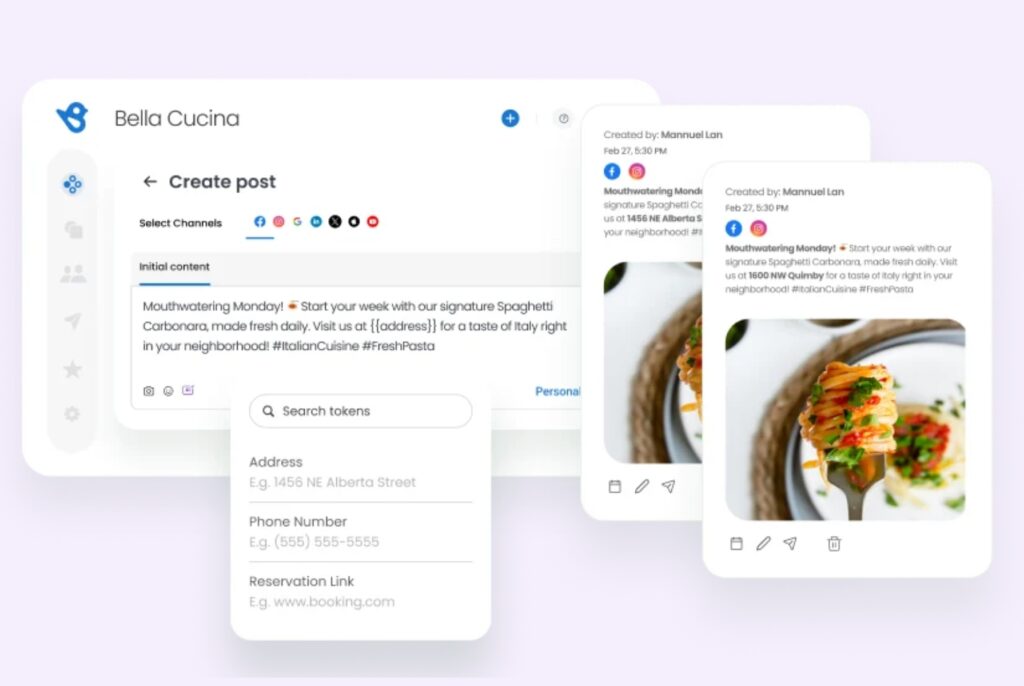
Monitor real-time engagement and respond with AI
Engage followers efficiently with instant notifications for comments, reviews, or messages. AI-driven replies allow hotels to maintain active social media channels.
Gain competitive insights and optimize your strategy
Track competitors’ performance across social media platforms, analyze their audience growth, and refine your own approach to outperform the competition. Birdeye Social AI provides data-driven tools to identify trends and boost social media influence.
Schedule and analyze posts for maximum impact
The in-built calendar offers suggestions on the best times to post per platform to increase brand awareness and engagement for an impactful presence.

Originally published




